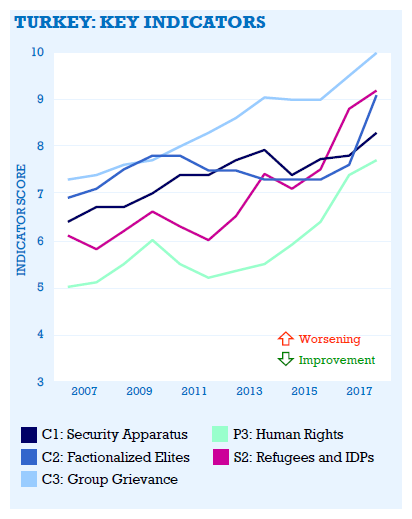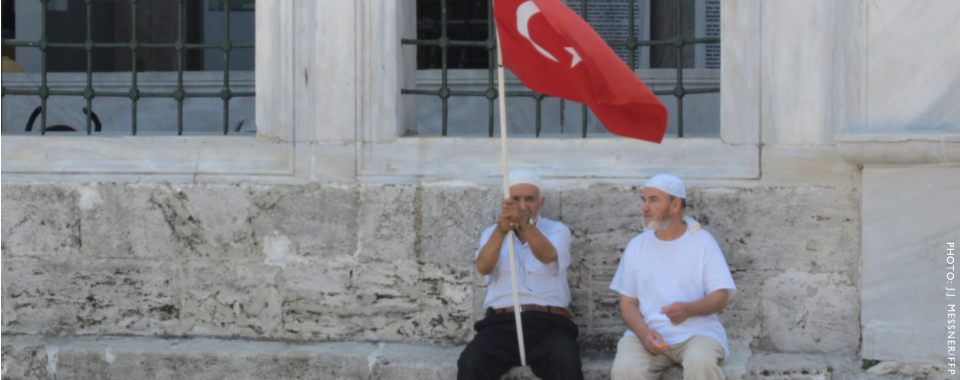BY AMANDA QUINN
Bordered by eight countries and situated between Europe and Asia, Turkey has been affected by geopolitical forces on multiple fronts. In recent years, a combination of internal and external pressures has pushed the country into challenging times, especially throughout 2016. Turkey’s overall score on the 2017 Fragile States Index worsened by 3.5 points from its score on the 2016 Index, its most drastic change since 2012, and also making Turkey the third-most worsened country on the FSI over the past year, behind only Ethiopia and Mexico. Between an attempted military coup, multiple major terrorist attacks, continued spillover from the crisis in Syria, and an increasingly authoritarian government, it is impossible to pinpoint a single driver of Turkey’s growing instability.
 At the center of Turkey’s shaky domestic and geopolitical situation is President Recep Tayyip Erdogan. Increasingly, Erdogan’s leadership has been described as autocratic, with parallels being drawn with the leadership style (and tactics) of Russian President Vladimir Putin. Confronted with a challenging security and political environment, Erdogan has been solidifying his hold on power by steering the government toward an executive presidency, essentially leaving the power of his office unchecked. In May, Prime Minister Ahmet Davutoglu abruptly resigned from his position amid dissension over Erdogan’s consolidation of power.
At the center of Turkey’s shaky domestic and geopolitical situation is President Recep Tayyip Erdogan. Increasingly, Erdogan’s leadership has been described as autocratic, with parallels being drawn with the leadership style (and tactics) of Russian President Vladimir Putin. Confronted with a challenging security and political environment, Erdogan has been solidifying his hold on power by steering the government toward an executive presidency, essentially leaving the power of his office unchecked. In May, Prime Minister Ahmet Davutoglu abruptly resigned from his position amid dissension over Erdogan’s consolidation of power.
In July 2016, an attempted military coup d’état carried out by a faction within the Turkish Armed Forces led to intense political pressure and a tightening of government control across the country. In the months following, thousands of soldiers and judges were detained, and the country’s major newspaper was brought under state control. Erdogan also placed the country in a state of emergency, giving himself extensive powers, such as the ability to bypass parliament when drafting laws. Government institutions checking the president’s power were already breaking down and the attempted coup gave Erdogan an excuse to further stretch his power. Erdogan accused Fethullah Gülen, leader of the Gülen movement, of being behind the violent coup. The Gülen movement is an Islamic religious movement that emerged in the 1970s in opposition to secularism. Though Erdogan and Gülen were once allies, the relationship has long since broken down, and in 2015, the Gülenist movement was classified as a terrorist organization within Turkey. Erdogan’s accusation has led to the arbitrary detention of at least 2,200 judges and prosecutors by accusing them of involvement with the Gülenists despite a lack of evidence in most cases. Additionally, over 100,000 public officials and civil servants were dismissed from their positions.
Turkey’s tenuous security situation has also been a driver of the country’s increasing fragility. Its Security Apparatus score worsened by 0.5 to 8.3 from an already poor score of 7.8 in the 2016 Index. Several major terrorist attacks shook the country over the course of the year, including an attack on Istanbul’s Atatürk Airport in June and a shooting at a city nightclub on New Year’s Eve. Additionally, the government’s relationship with its Kurdish population remains ever-complicated. When Erdogan came to power, he indicated a willingness to work on a peace agreement with Kurdish forces. Fast forward to 2016 and violence between Kurdish militants and the state continues after a ceasefire with the PKK fell to the wayside in 2015. There have been demands for a renewal of the peace agreement, but they have been stifled, along with any other criticism of Turkey’s government.
Turkey’s domestic issues have been compounded by the ongoing crisis in bordering Syria. According to the United Nations High Commissioner for Refugees, Turkey hosts an estimated 2.7 million Syrian refugees, making it the largest host country of registered refugees. Many refugees and asylum seekers in Turkey lack employment and education opportunities. The Turkish-Syrian border remains closed and the situation remains tense.
Looking forward, Turkey seems set to continue down the road to autocracy. The country was once positioned to join the European Union, but the political events of 2016 led to a suspension of accession negotiations. Unless steps are taken to reverse course, Turkey’s instability will remain a critical issue in the region. Ongoing external pressures, especially Syria’s uncertain future, coupled with Turkey’s internal security and political issues indicate that Turkey has a difficult road ahead.
